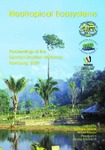Por favor, use este identificador para citar o enlazar este ítem:
http://www.alice.cnptia.embrapa.br/alice/handle/doc/1058438Registro completo de metadatos
| Campo DC | Valor | Lengua/Idioma |
|---|---|---|
| dc.contributor.author | RODRIGUES, G. S. | pt_BR |
| dc.contributor.author | KITAMURA, P. C. | pt_BR |
| dc.contributor.author | MEYER, L. F. F. | pt_BR |
| dc.contributor.author | DENICH, M. | pt_BR |
| dc.contributor.author | SÁ, T. D. de A. | pt_BR |
| dc.date.accessioned | 2016-12-12T23:06:49Z | - |
| dc.date.available | 2016-12-12T23:06:49Z | - |
| dc.date.created | 2016-12-12 | pt_BR |
| dc.date.issued | 2002 | pt_BR |
| dc.identifier.citation | In: GERMAN-BRAZILIAN ON WORKSHOP ON NEOTROPICAL ECOSYSTEMS - ARCHIEVEMENTS AND PROSPECTS OF COOPERATIVE RESEARCH, 2000, Hamburg. Proceedings. Geesthacht: GHSS, 2002. p. 777-782. | pt_BR |
| dc.identifier.uri | http://www.alice.cnptia.embrapa.br/alice/handle/doc/1058438 | pt_BR |
| dc.description | Abstract: The rotational slash-and-burn agricultural system, largely dependent on the duration of the fallow period to restore the productivity of the land, is still extensively practiced by small land holders in the Northeastern Pará State, Brazil. Clear signs of agronomic and ecological failure of this system have been represented by consistently decreasing crop yields, fallow period shortening, and structural and compositional depletion of the natural recovering vegetation (capoeira). The SHIFT-capoeira research project (ENV-25) has been developing and introducing fire-free alternative management practices such as (i) the enrichment of the capoeira vegetation to improve biomass production and nutrient recovery/fixation, (ii) use of a bush-chopper that allow the mulching (instead of burning) of the biomass, (iii) mulch management/fertilization for optimal weed control and crop absorption of stocked nutrients, and (iv) crop rotation/association/cultivation techniques that are, on the one hand, adapted to fire-free agricultural production, and on the other, more suited to fulfil the household as well as the commercial needs of the farmers. The focus of this study is the evaluation of the contribution of these management alternatives for the sustainability of the agricultural activity developed by the small land holders in Northeastern Pará, with special reference to the non- monetary gains in terms of ecological function restoration and natural resources conservation afforded by fire-free management practices. The final purpose of the research effort is to draw indications of public policies directed to improving the efficacy of the development programs dedicated to the small land-holders of the region. | pt_BR |
| dc.language.iso | eng | eng |
| dc.rights | openAccess | eng |
| dc.subject | Sistema de pousio | pt_BR |
| dc.subject | Capoeira enriquecida | pt_BR |
| dc.title | Integration of information on fallow systems toward supporting public policies. | pt_BR |
| dc.type | Artigo em anais e proceedings | pt_BR |
| dc.date.updated | 2016-12-12T23:06:49Z | pt_BR |
| dc.subject.thesagro | Uso da Terra | pt_BR |
| dc.description.notes | Editado por Reinhard Lieberei, Helmut Bianchi, Vera Boehm, Christoph Reisdorff. | pt_BR |
| riaa.ainfo.id | 1058438 | pt_BR |
| riaa.ainfo.lastupdate | 2016-12-12 | pt_BR |
| dc.contributor.institution | GERALDO STACHETTI RODRIGUES, CNPMA; PAULO CHOJI KITAMURA, CNPMA; LEANDRO FREDERICO FERRAZ MEYER, FCAP; MANFRED DENICH, UNIVERSITÄT BONN; TATIANA DEANE DE ABREU SA, CPATU. | pt_BR |
| Aparece en las colecciones: | Artigo em anais de congresso (CNPMA)  | |
Ficheros en este ítem:
| Fichero | Descripción | Tamaño | Formato | |
|---|---|---|---|---|
| AA012002.pdf | 1,11 MB | Adobe PDF |  Visualizar/Abrir |









